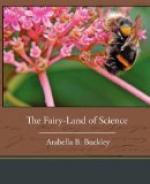Week 7
LECTURE III The Aerial Ocean in Which We Live
Did you ever sit on the bank of a river in some quiet spot where the water was deep and clear, and watch the fishes swimming lazily along? When I was a child this was one of my favourite occupations in the summertime on the banks of the Thames, and there was one question which often puzzled me greatly, as I watched the minnows and gudgeon gliding along through the water. Why should fishes live in something and be often buffeted about by waves and currents, while I and others lived on the top of the earth and not in anything? I do not remember ever asking anyone about this; and if I had, in those days people did not pay much attention to children’s questions, and probably nobody would have told me, what I now tell you, that we do live in something quite as real and often quite as rough and stormy as the water in which the fishes swim. The something in which we live is air, and the reason that we do not perceive it, is that we are in it, and that it is a gas, and invisible to us; while we are above the water in which the fishes live, and it is a liquid which our eyes can perceive.
But let us suppose for a moment that a being, whose eyes were so made that he could see gases as we see liquids, was looking down from a distance upon our earth. He would see an ocean of air, or aerial ocean, all round the globe, with birds floating about in it, and people walking along the bottom, just as we see fish gliding along the bottom of a river. It is true, he would never see even the birds come near to the surface, for the highest-flying bird, the condor, never soars more than five miles from the ground, and our atmosphere, as we shall see, is at least 100 miles high. So he would call us all deep-air creatures, just as we talk of deep-sea animals; and if we can imagine that he fished in this air-ocean, and could pull one of us out of it into space, he would find that we should gasp and die just as fishes do when pulled out of the water.




